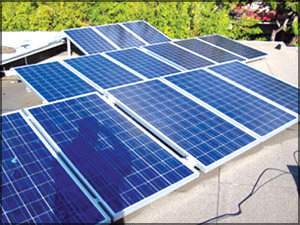|

Successful solar power project
Solar power has long been recognised as a viable(practicable) and
clean source of power. On the long run, it is said to be cheaper too.
is said to be cheaper too.
Sri Lanka has also seen its fair share of solar power projects over
the years. Such a project is the one being successfully implemented in
the Central Province with financial assistance from Finland.
Projects numbering 151 have already been completed in the Matale
district and have encompassed(encircled) many rural schools, health
centres and temples. Several drinking water projects in the area have
also been completed with the help of solar power. The majority of these
projects are being carried out in the district's dry zone.
This programme is being implemented in selected areas of the island
with Rs. 3,500 million been estimated for it.
Number of world millionaires up
The number of millionaires in the world in terms of dollars rose from
7.2 million in 2005 to 9.6 million in 2006, according to the findings of
a new study published by the Boston Consulting Group, a Paris-based
management consulting firm.
The United States is classified in the first position followed by
Japan, Britain and Germany, according to the study, which is entirely
based on financial assets placed under asset management firms, therefore
excluding real estate(landed property) and other forms of investments.
Xinhua
Scientists use magnets to tune magnets
British-led scientists have created a technique to switch a
material's magnetic properties from "hard" to "soft" and back again.
The researchers, led by scientists at the London Centre for
Nanotechnology, said the discovery might lead to new ways of controlling
electromagnetic fields "Whether a magnet is hard or soft determines what
you can use it for," said University College London Professor Gabriel
Aeppli, director of the centre.
"Typically, you would use a permanent magnet to fix a note to the
door of your refrigerator because you want it to stay there for a long
time. On the other hand, you might use a soft magnet in a motor or
transformer because it would be better at adapting to the rapid changes
in alternating current and would dissipate (spread) much less energy
than a hard magnet."
"It is very rare to be able to continuously tune wall pinning in a
magnet," he said, "but we have now shown how it can be done in a model
magnet at a low temperature."
United Press International
School equipment distributed in Jaffna
You may have read the news item about the government distributing
school books and equipment in the Jaffna Peninsula. At the request of
the Ministry of Education, UNICEF took part in the project to ensure the
distribution of school kits to every school student in the area.
Head of UNICEF's Education Section in Sri Lanka, Ita Sheehy said the
distribution had been carried over a one-month period and had reached an
estimated 140,000 primary and secondary schoolchildren who are affected
by the ongoing conflict.
It had been considered as a challenge since Jaffna had been cut off
from the rest of the country due to the conflict. Many of the schools
were in difficult-to-access high security areas. However, each of the
404 schools was visited by a team from the Education authorities and
UNICEF through this project.
The support of the military, the Government Agent, the Commissioner
General for Essential Services and the teachers and students themselves
was fully extended towards the success of this project.
The scarcity of school material had prompted many schools in the area
to recycle material in order to keep children supplied. The materials
which were distributed included notebooks, drawing pads, pencils and
pens, rulers, erasers and sharpeners.
The Festival of Lights
 Our
Hindu readers will be celebrating Deepavali on November 8. Deepavali,
the Festival of Lights, is celebrated by Hindus the world over with much
gaiety whether they are young or old, rich or poor as they believe the
festival dispels the darkness and lights up their lives. Our
Hindu readers will be celebrating Deepavali on November 8. Deepavali,
the Festival of Lights, is celebrated by Hindus the world over with much
gaiety whether they are young or old, rich or poor as they believe the
festival dispels the darkness and lights up their lives.
In India, the festival is celebrated over four days. It marks the
vanquishing (defeating) of the demon Narakasura. It is celebrated by
lighting clay lamps, decorating their houses, lighting firecrackers and
inviting loved ones to their households for partaking in a sumptuous
feast.
The lighting of lamps is a way of paying obeisance to gods for
attainment of health, wealth, knowledge, peace, valour and fame.
National Green Month
A National Green Month has been declared, from October 15 to November
15, by the Ministry of Environment and Natural Resources.
The programme got under way with the celebration of the National Tree
Plantation Day on October 15. All State sector organisations are
expected to conduct environmental activities and programmes during this
period.
Ministries have already received instructions from the Ministry of
Public Administration to plant trees at their respective premises. A
number of environment-related programmes have been organised by the
Central Environment Authority to mark this special month throughout the
country.
These include tree planting ceremonies, composting, solid waste
management awareness programmes, water quality upgrading programmes and
air quality testing programmes.
Environmental damage during armed conflict
The whole world talks about the human and material costs of war and
armed conflicts, but the effects on the environment have been largely
neglected. But this doesn't mean that it doesn't happen or that it
should be forgotten.
The effects of war and conflicts on the environment include polluted
water, air and land; unregulated plunder of natural resources by warring parties; and the negative impact of mass
population movements on water, biodiversity and other ecosystem
services.
of natural resources by warring parties; and the negative impact of mass
population movements on water, biodiversity and other ecosystem
services.
These effects are long lasting, affect a large part of the
population, sometimes even from neighbouring countries, and are
reversible only in the long term. With more advanced and harmful weapons
being used nowadays, the effects are on a much larger scale than they
used to be.
An example for the above occurred during the 2006 conflict between
Israel and the Hizbollah guerillas in Lebanon; fuel weighing more than
15,000 tons was released from a power station south of Beirut, Lebanon,
affecting the Lebanese and Syrian coastline, polluting beaches and
coastal waters and damaging the fishery and tourism industries.
The UN General Assembly, through its UN Environmental Partnership (UNEP),
declared November 6 of each year as the International Day for Preventing
the Exploitation of the Environment in War and Armed Conflict, on
November 5, 2001 to highlight the adverse effects of war and conflict on
the environment.
It has been realised that though such effects are sometimes
unavoidable, most often they could be prevented. Parties involved in
wars and conflicts have a responsibility to observe international laws
such as the Geneva Convention, which have certain guidelines pertaining
to the environment. However, environmental concerns have been overlooked
in most international laws and conventions.
The day was celebrated for the first time on November 6, 2002 and is
now in its fifth year. It reflects on the fact that the exploitation of
nature as a tool in armed conflicts is nothing new in human history.
Returning to normalcy will be difficult for people in such situations if
the environmental aspect is neglected. The day calls for the response
and action of the international community to make these objectives
successful.
Now, more governments are asking the UNEP to conduct post-conflict
environment assessments. Such groups are already active in Lebanon,
Sudan and Iraq. The team working in Sudan has found widespread and
severe environmental damage in most parts of the country especially
deforestation and desertification.
The conflit has resulted in environmental degradation (damage),
competition for resoures and regional climate change in Darfur, Sudan.
The UNEP is also helping the government of Iraq to restore and manage
its marshlands and rehabilitate its environment and infrastruture. The
marshlands of the Euphrates and Tigris Delta were drained during the
conflicts of the 1980s and 1990s as part of the deliberate targeting of
ecosystems to achieve political and military ends.
2008 - Year of the Potato
The United Nations officially launched the 'International Year of the
Potato 2008', an initiative mocked in private by some diplomats, but enabling governments to raise much-needed
funds for agricultural research.
private by some diplomats, but enabling governments to raise much-needed
funds for agricultural research.
The move to "increase awareness of the importance of the potato as a
food in developing nations" was proposed by the UN's Rome-based Food and
Agricultural Organisation and adopted by the General Assembly in 2005.
Throughout 2008, the International Year will seek to underline the
humble spud's role in improving food security and poverty alleviation
(lessening).
AFP |
